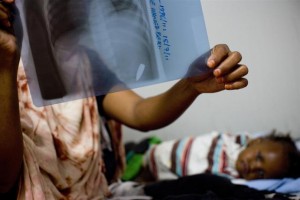UNICEF extremely concerned about the impact of escalating conflict in Somalia on children 24 children killed and 58 seriously injured in October
2011-11-15
Increasing numbers of children and civilians are being caught in attacks and cross-fire across the south and centre of Somalia said UNICEF’s Representative to Somalia, Sikander Khan. Over the last several weeks, we have seen a very worrying rise in killings and serious injuries of children."

According to the UN’s monitoring and reporting mechanism for grave violations of children’s rights, 24 children have been killed in the conflict in October; nearly double the number of child killings confirmed in every month this year. In addition, 58 children have been confirmed to have sustained serious injuries in October; the largest number of children injured as a result of the armed conflict in Somalia in any month this year. To date in 2011, the monitoring and reporting mechanism has confirmed nearly 300 children to be seriously injured and over 100 children killed in the on-going conflict.
Also of concern are the recruitment and use of children for armed services and sexual violence of children and women. This year, the UN’s monitoring and reporting mechanism has confirmed over 600 children to be recruited and used for armed service with over 200 more, mostly girls, confirmed to have been raped.
Somali children’s lives are being put more and more in grave danger with the increasing conflict. In accordance with international law, we call on all parties to the conflict in Somalia to stop all killing, maiming, recruitment for armed services and rape of children. All children must immediately be assured of safety and protection from hostile acts, stated Khan.
 |
![On 27 July, Asad [NAME CHANGED] (left) holds a gun in a reception centre for former soldiers from the rebel Al-Shabaab group, in Mogadishu, the capital. About 15 days ago, I was on my way back from school when some men with long beards approached me and told me that they wanted to give me some money, he said. They handed me 40 US dollars... They said if I went with them that I could keep the money they had given me. So I went with them to a camp that was near to Mogadishu. There were many men in this camp and lots of other children around my age. I was given a place to sleep and we were given lessons in things like guns and weapons... They were nice to us, these people. They never shouted at us and only wanted us to be good at shooting... A few days ago we were told that we were leaving the camp for the front line in Mogadishu. We walked to a group of houses where we waited. Then very early yesterday morning there was a big attack... There was a lot of shooting and firing and shouting& I fired all of my bullets and then realized that all of our colleagues in buildings around us had gone& So we decided to surrender. We walked out of where we were with our arms and guns above our heads. The AU [African Union] soldiers treated us very well and didn't fire at us. I was scared they might. The soldiers told us to put the weapons down and then gave us some food and water. They were kind to us& I hope that I can go home. Al-Shabaab forces control much of southern and central Somalia. AMISOM was established by the United Nations to support peace, stability and the safe delivery of humanitarian aid in the country. UNICEF works on all sides of the long-running conflict. By 29 July 2011, the crisis in the Horn of Africa affecting primarily Kenya, Somalia, Ethiopia and Djibouti continues, with a worsening drought, rising food prices and an ongoing conflict in Somalia. More than 12 million people are threatened by the regions worst drought in 60 years. Some 500,000 severely malnourished children in drought-affected areas are at imminent risk of dying, while a further 1.6 million moderately malnourished children and the wider-affected population are at high risk of disease. Somalia faces one of the worlds most severe food security crises; and as many as 100,000 displaced people have sought security and assistance in Mogadishu, the still-embattled capital, in the last two months, and tens of thousands are fleeing into Kenya and Ethiopia. Famine has been declared in the Lower Shabelle and Bakool areas, and it is believed all of Southern Somalia could fall into a state of famine without immediate intervention. Across Southern Somalia, 1.25 million children are in urgent need of life-saving assistance, and 640,000 are acutely malnourished. UNICEF has delivered supplementary feeding supplies for 65,000 children and therapeutic food for 16,000 severely malnourished children in Southern Somalia, and is working with UN, NGO and community partners to expand blanket supplementary feeding programmes where needed. UNICEF is also supporting a range of other interventions, including an immunization campaign targeting 40,000 children in Mogadishu. A joint United Nations appeal for humanitarian assistance for the region requires US$2.5 billion, less than half of which has been committed.](/wp-content/uploads/2015/12/15-11-11_somalia_conflict_recruitment-for-armed_services-300x189.jpg) |
“Many of the hundreds of thousands of children already facing a situation of life and death due to famine and disease are now facing the risk of having life-saving assistance cut off to them. We call on all actors to enable us to respond fully and rapidly to children and women in urgent need. Thousands of children’s lives are at stake and on our watch”, Khan declared.









